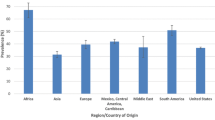VCT has been shown to be an important HIV risk reduction strategy; however, little is known about who attends VCT or why people seek VCT. A retrospective analysis was performed on charts of 6330 clients who attended VCT between 1994 and 2002 at Y.R. Gaitonde Centre for AIDS Research and Education, a non-governmental organization in Chennai, Tamil Nadu, India. Most clients reported more than one reason for attending VCT, and the most commonly reported reasons were risk behavior, having symptoms, having a current HIV-positive partner, and reconfirming a previous positive HIV test. Reasons varied by gender and over time, and the likelihood of testing positive for HIV varied by reason reported. Understanding why people seek VCT informs an understanding of knowledge and attitudes about HIV and HIV testing, which has implications for the development of education, outreach and other HIV prevention services.



Similar content being viewed by others
REFERENCES
Allen, S., Meinzen-Derr, J., Kautzman, M., Zulu, I., Trask, S., and Fideli, U., et al. (2003). Sexual behavior of HIV discordant couples after HIV counseling and testing. AIDS, 17 733–740.
Anvikar, A. R., Chakma, T., and Rao, V. G. (2005). HIV epidemic in Central India: Trends over 18 years (1986–2003). Acta Tropica, 93 289–294.
Chippindale, S., French, P., and Miller, D. (1998). Reasons for HIV antibody testing: Plus ca change? International Journal of STD & AIDS, 9 219–222.
Higgins, D. L., Galavolli, C., O’Reilly, K. R., Schnell, D. J., Moore, M., Rugg, D. L., et al. (1991). Evidence for the effects of HIV antibody counseling and testing on risk behaviors. Journal of the American Medical Association, 266 2419–2429.
Kawichai, S., Celentano, D. D., Chaifongsri, R., Nelson, K. E., Srithanaviboonchai, K., and Natpratan, C., et al. (2002). Profiles of HIV voluntary counseling and testing of clients at a district hospital, Chiang Mai Province, northern Thailand, from 1995 to 1999. Journal of Acquired Immune Deficiency Syndrome, 30 493–502.
National AIDS Control Organization. (2004). Facts & Figures. Retrieved November 5, 2005 from http://www.nacoonline.org/facts.htm.
Singh, T. N., Kananbala, S., Thongam, W., Devi, K. S., and Singh, N. B. (2005). Increasing trend of seropositivity among commercial sex workers attending the Voluntary Counseling and Testing Centre in Manipur, India. International Journal of STD and AIDS, 16 166–169.
Sinha, P. K., Ranjan, A., Siddique, N. A., Anil, C. K., Priya, A., and Bhattacharya, P. D. S. K. (2003). Usefulness of voluntary counseling and testing for HIV/AIDS: Bihar as an example. Journal of Acquired Immune Deficiency Syndrome, 33 407–408.
Solomon, S., Ganesh, A., Ekstrand, M., Barclay, J., Kumarasamy, N., and Mandel, J., et al. (2000). High HIV seropositivity at an anonymous testing site in Chennai, India: Client profile and trends over time. AIDS and Behavior, 4 71–81.
Syed, I. H., Solomon, S., Murugavel, K. G., Suhas Solomon, S., and Balakrishnan, P. (2006). Evaluation and diagnostic usefulness of domestic and imported Enzyme-Linked Immunosorbent Assays for detection of human immunodeficiency virus type 1 antibody in India. Clinical and Diagnostic Laboratory Immunology, in press.
The Voluntary HIV-1 Counseling and Testing Efficacy Study Group. (2000). Efficacy of voluntary HIV-1 counseling and testing in individuals and couples in Kenya, Tanzania, and Trinidad: A randomized trial. Lancet, 356 103–112.
UNAIDS. (1997). UNAIDS policy on HIV testing and counseling. Geneva: UNAIDS.
UNAIDS. (1999). Counseling and voluntary HIV testing for pregnant women in high HIV prevalence countries: Elements and issues. Geneva: UNAIDS, 7.
UNAIDS. (2004). Epidemiological facts sheets on HIV/AIDS and sexually transmitted infections: India 2004 update. Retrieved January 30, 2006 from http://data.unaids.org/Publications/Fact-Sheets01/India_EN.pdf.
Weinhardt, L. S., Carey, M. P., Johnson, B. T., and Bickham, N. L. (1999). Effects of HIV counseling and testing on sexual risk behavior: A meta-analytic review of published research, 1985–1997. American Journal of Public Health, 89 1397–1405.
Wolitski, R., MacGowan, R. J., Higgins, D. L., and Jorgensen, C. M. (1997). The effects of HIV counseling and testing on risk-related practices and help-seeking behavior. AIDS Education and Prevention, 9 52–67.
ACKNOWLEDGMENTS
Thank you to Dr. David Celentano for providing funding to facilitate an internship at YRG CARE for Fiona Kouyoumdjian.
Author information
Authors and Affiliations
Corresponding author
Rights and permissions
About this article
Cite this article
Solomon, S., Cecelia, A.J., James, R. et al. Why are People Getting Tested? Self-Reported Reasons for Seeking Voluntary Counseling and Testing at a Clinic in Chennai, India. AIDS Behav 10, 415–420 (2006). https://doi.org/10.1007/s10461-006-9070-1
Published:
Issue Date:
DOI: https://doi.org/10.1007/s10461-006-9070-1



